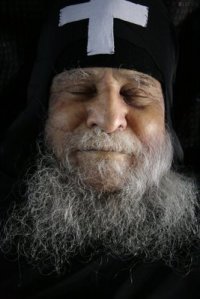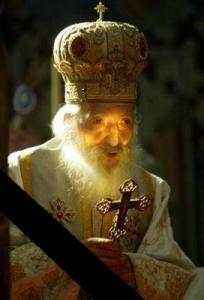In this case indeed He discloses also another sign, and that no small one, of His own Godhead, and of His equality in honor with the Father. For whereas they said, “To unbind sins pertains to God only,” He not only unbinds sins, but also before this He makes another kind of display in a thing which pertained to God only; the publishing the secrets in the heart. For neither had they uttered what they were thinking.
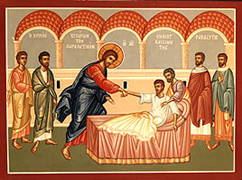 For “behold, certain of the scribes,” it says, “said within themselves, This man blasphemes. And Jesus knowing their thoughts, said, Wherefore think ye evil in your hearts?” Matthew 9:3-4
For “behold, certain of the scribes,” it says, “said within themselves, This man blasphemes. And Jesus knowing their thoughts, said, Wherefore think ye evil in your hearts?” Matthew 9:3-4
But that it belongs to God only to know men’s secrets, hear what says the prophet, “Thou most entirely alone know the hearts;” 2 Chronicles 6:30 and again, “God tries the hearts and reins;” and Jeremiah too says, “The heart is deep above all things, and it is man, and who shall know him?”and, “Man shall look on the face, but God on the heart.” 1 Samuel 16:7 And by many things one may see, that to know what is in the mind belongs to God alone.
Implying therefore that He is God, equal to Him that begat Him; what things they were reasoning in themselves (for through fear of the multitude, they durst not utter their mind), this their opinion He unveils and makes manifest, evincing herein also His great gentleness.
“For wherefore,” says He, “think ye evil in your hearts?” Matthew 9:4
And yet if there were cause for displeasure, it was the sick man who should have been displeased, as being altogether deceived, and should have said “One thing I came to have healed, and amendest Thou another? Why, whence is it manifest that my sins are forgiven?”
But now he for his part utters no such word, but gives himself up to the power of the healer; but these being curious and envious, plot against the good deeds of others. Wherefore He rebukes them indeed, but with all gentleness. “Why, if you disbelieve,” says He, “what went before, and account my saying a boast; behold I add to it also another, the uncovering of your secrets; and after that again another.” What then is this? The giving tone to the body of the paralyzed.
And whereas, when He spoke unto the sick of the palsy, He spoke without clearly manifesting His own authority: for He said not, “I forgive you your sins,” but, “your sins be forgiven you:” upon their constraining, He discloses His authority more clearly, saying, “But that you may know that the Son of Man has power on earth to forgive sins.”
Do you see, how far He was from unwillingness to be thought equal to the Father? For He said not at all, “The Son of Man has need of another;” or, “He has given Him authority,” but, “He has authority.” Neither does He say it for love of honor, but “to convince you,” so He speaks, “that I do not blaspheme in making myself equal with God.”
Thus everywhere His will is to offer proofs clear and indisputable; as when He says, “Go your way, show yourself to the priest;” Matthew 8:4 and when He points to Peter’s wife’s mother ministering, and permits the swine to cast themselves down headlong. And in the same manner here also; first, for a certain token of the forgiveness of his sins, He provides the giving tone to his body: and of that again, his carrying his bed; to hinder the fact from being thought a mere fancy. And He does not this, before He had asked them a question. “For whether is easier,” says He, “to say, Your sins be forgiven you? or to say, Take up your bed, and go unto your house?” Matthew 9:5-6 Now what He says is like this, “Which seems to you easier, to bind up a disorganized body, or to undothe sins of a soul? It is quite manifest; to bind up a body. For by how much a soul is better than a body, by so much is the doing away sins a greater work than this; but because the one is unseen, the other in sight, I throw in that, which although an inferior thing, is yet more open to sense; that the greater also and the unseen may thereby receive its proof;” thus by His works anticipating even now the revelation of what had been said by John, that “He takes away the sins of the world.”
Well then, having raised him up, He sends him to his house; here again signifying His unboastfulness, and that the event was not a mere imagination; for He makes the same persons witnesses of his infirmity, and also of his health. For I indeed had desired, says He, through your calamity to heal those also, that seem to be in health, but are diseased in mind; but since they will not, depart thou home, to heal them that are there.
Do you see how He indicates Him to be Creator both of souls and bodies? He heals therefore the palsy in each of the two substances, and makes the invisible evident by that which is in sight. But nevertheless they still creep upon the earth.
“For when the multitudes saw it, they marveled, and glorified God, which” (it is said) “had given such power unto men:”for the flesh was an offense unto them. But He did not rebuke them, but proceeds by His works to arouse them, and exalt their thoughts. Since for the time it was no small thing for Him to be thought greater than all men, as having come from God. For had they well established these things in their own minds, going on orderly they would have known, that He was even the Son of God. But they did not retain these things clearly, wherefore neither were they able to approach Him. For they said again, “This man is not of God;” John 9:16 “how is this man of God?” And they were continually harping on these things, putting them forward as cloaks for their own passions.
Which thing many now also do; and thinking to avenge God, fulfill their own passions, when they ought to go about all with moderation. For even the God of all, having power to launch His thunderbolt against them that blaspheme Him, makes the sun to rise, and sends forth the showers, and affords them all other things in abundance; whom we ought to imitate, and so to entreat, advise, admonish, with meekness, not angry, not making ourselves wild beasts.
For no harm at all ensues unto God by their blasphemy, that you should be angered, but he who blasphemed has himself also received the wound. Wherefore groan, bewail, for the calamity indeed deserves tears. And the wounded man, again,—nothing can so heal him as gentleness: gentleness, I say, which is mightier than any force.
See, for example, how He Himself, the insulted one, discourses with us, both in the Old Testament, and in the New; in the one saying, “O my people, what have I done unto you?” Micah 6:3 in the other, “Saul, Saul, why do you persecute me.” Acts 9:4 And Paul too bids, “In meekness instruct those that oppose themselves.” 2 Timothy 2:25 And Christ again, when His disciples had come to Him, requiring fire to come down from heaven, strongly rebuked them, saying, “You know not what manner of spirit you are of.”
And here again He said not, “O accursed, and sorcerers as you are; O you envious, and enemies of men’s salvation;” but, “Wherefore think ye evil in your hearts?”
We must, you see, use gentleness to eradicate the disease. Since he who is become better through the fear of man, will quickly return to wickedness again. For this cause He commanded also the tares to be left, giving an appointed day of repentance. Yea, and many of them in fact repented, and became good, who before were bad; as for instance, Paul, the Publican, the Thief; for these being really tares turned into kindly wheat. Because, although in the seeds this cannot be, yet in the human will it is both manageable and easy; for our will is bound by no limits of nature, but has freedom of choice for its privilege.
Accordingly, when you see an enemy of the truth, wait on him, take care of him, lead him back into virtue, by showing forth an excellent life, by applying “speech that cannot be condemned,” Titus 2:8 by bestowing attention and tender care, by trying every means of amendment, in imitation of the best physicians. For neither do they cure in one manner only, but when they see the wound not yield to the first remedy, they add another, and after that again another; and now they use the knife, and now bind up. And do thou accordingly, having become a physician of souls, put in practice every mode of cure according to Christ’s laws; that you may receive the reward both of saving yourself and of profiting others, doing all to the glory of God, and so being glorified also yourself. “For them that glorify me,” says He, “I will glorify; and they that despise me, shall be lightly esteemed.”
Let us, I say, do all things unto His glory; that we may attain unto that blessed portion, unto which God grant we may all attain, by the grace and love towards man of our Lord Jesus Christ, to whom be glory and might forever and ever. Amen.



 Posted by frmilan
Posted by frmilan 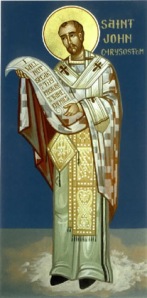 This paralytic, however, was different from that one who is set forth in John. John 5:1 For he lay at the pool, but this at Capernaum; and that man had his infirmity thirty and eight years, but concerning this, no such thing is mentioned; and the other was in a state destitute of protectors, but this had some to take care of him, who also took him up, and carried him. And to this He says, “Son, your sins be forgiven you, “but to that He says, “Will you be made whole?” John 5:6 And the other He healed on a Sabbath day, but this not on a Sabbath, for else the Jews would have laid this also to His charge; and in the case of this man they were silent, but in that of the other they were instant in persecuting him.
This paralytic, however, was different from that one who is set forth in John. John 5:1 For he lay at the pool, but this at Capernaum; and that man had his infirmity thirty and eight years, but concerning this, no such thing is mentioned; and the other was in a state destitute of protectors, but this had some to take care of him, who also took him up, and carried him. And to this He says, “Son, your sins be forgiven you, “but to that He says, “Will you be made whole?” John 5:6 And the other He healed on a Sabbath day, but this not on a Sabbath, for else the Jews would have laid this also to His charge; and in the case of this man they were silent, but in that of the other they were instant in persecuting him.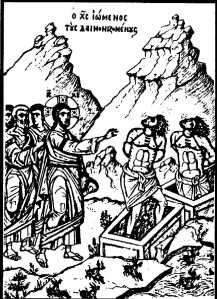 We do not know why these men are possessed by demons. We only know the results of the possession. We see their anger with God and their fellow man in the words of the Gospel saying “coming out from the tombs, exceedingly fierce, so that no one could pass that way.” (Matthew 8:28)
We do not know why these men are possessed by demons. We only know the results of the possession. We see their anger with God and their fellow man in the words of the Gospel saying “coming out from the tombs, exceedingly fierce, so that no one could pass that way.” (Matthew 8:28)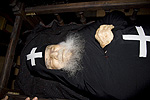 The following was taken from website of the Holy Monastery of Pantocrator
The following was taken from website of the Holy Monastery of Pantocrator